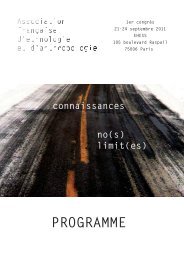state of the world's cities 2012/2013 - United Nations Sustainable ...
state of the world's cities 2012/2013 - United Nations Sustainable ...
state of the world's cities 2012/2013 - United Nations Sustainable ...
You also want an ePaper? Increase the reach of your titles
YUMPU automatically turns print PDFs into web optimized ePapers that Google loves.
From Comparative Advantage to Urban Prosperityproviding adequate infrastructure and urban services,improving <strong>the</strong> quality <strong>of</strong> life, making society more equitable,and ensuring environment sustainability.Of course, <strong>the</strong>re are instances where non-democraticleadership is associated with a degree <strong>of</strong> economicprosperity, but this is <strong>the</strong> exception ra<strong>the</strong>r than <strong>the</strong> rule.Indeed, non-democratic regimes are coterminous withpathologies such as predation and expropriation, and in<strong>the</strong> long-run undermine <strong>the</strong> institutions underlying thatprosperity. 18 It has been noted that autocratic governments<strong>of</strong>ten distribute benefits to an elite group, while democraticgovernments distribute benefits more widely to gain <strong>the</strong>support <strong>of</strong> <strong>the</strong> general public. 19Favourable business environmentA business-conducive environment is needed for a vibrantprivate sector, attracting and retaining investment (includingforeign direct), creating jobs and improving productivity –all <strong>of</strong> which are important for <strong>the</strong> promotion <strong>of</strong> growth andfor expanded opportunities for <strong>the</strong> poor. 20Cities such as Singapore, Hong Kong, Seoul, Busan,Kuala Lumpur, Tokyo, Yokohama and Osaka all featurefavourable business environments, with beneficial effects onprosperity. In Africa, it is easier to do business in St Louis(Mauritius), Johannesburg, Kigali, Tunis and Gaboronethan in Kinshasa, Conakry, Asmara, N’Djamena or Bangui,which are located in countries that rank low in businessenvironment. Generally, <strong>cities</strong> in <strong>the</strong> former group <strong>of</strong>countries tend to be more prosperous than those in <strong>the</strong> latter.Rwanda has consciously deployed a business-friendlyenvironment, in <strong>the</strong> process bringing a higher degree <strong>of</strong>prosperity to its capital, Kigali. In recent years, Rwandahas undertaken reforms to streamline business procedures,create a favourable legal framework, reduce bureaucracy,and improve service delivery in order to promote bothdomestic and foreign investment. For instance, in Kigali,registering a business takes only three days and costs lessthan five per cent <strong>of</strong> <strong>the</strong> average income in an environmentdevoid <strong>of</strong> corruption, making <strong>the</strong> city “a very easy place fora global firm to operate”. 21Access to basic amenitiesAn efficient mass transit system is essential for <strong>the</strong> seamlessmovement <strong>of</strong> people and goods within and between <strong>cities</strong>,which in turn is vital for <strong>the</strong> prosperity <strong>of</strong> <strong>cities</strong>. In Lagos,<strong>the</strong> bus rapid transport (BRT) system has attracted newpatronage, lowered average fares, creating 1,000 jobs aswell as indirect employment for over 500,000 people. 22factA system that ensures that local <strong>of</strong>ficials are electedis ranked by local experts as <strong>the</strong> fifth most importantpolicy-related factor that enhances urban prosperity. The election<strong>of</strong> local or city <strong>of</strong>ficials presupposes <strong>the</strong> existence <strong>of</strong> stabledemocracy through which citizens are empowered to elect andremove <strong>the</strong>ir leaders through an open, free and fair ballot.policyPolitical institutions like democracy are essentialif <strong>the</strong> conditions for prosperity are to be laid outand nurtured.factAcross <strong>the</strong> four developing regions surveyed by UN-Habitat, a favourable business environment is perceivedto be most important in Asia – possibly pinpointing <strong>the</strong> role playedby <strong>cities</strong> in <strong>the</strong> region, creating an enabling environment forbusinesses and attracting foreign direct investment.factIn South Africa, <strong>the</strong>Access to basicGautrain is expectedamenities andto reduce road trafficinfrastructure, includingbetween Johannesburgimproved public transportand Pretoria by 25,000-and ICT, is a factor that30,000 cars per day; this is will enhance <strong>the</strong> prosperity<strong>of</strong> any city. This factorone <strong>of</strong> <strong>the</strong> busiest roads inis considered as mostSouth Africa where trafficimportant in African andincreases an average seven Asian <strong>cities</strong>.per cent every year. 23 InBogotá, <strong>the</strong> BRT providesfast and reliable transportfor over 1.4 millionCities with apassengers per day, in <strong>the</strong>policy favourablebusiness environment andprocess reducing trafficentrepreneurial culturecongestion and enhancing are more likely to beenvironmental quality. 24prosperous.In addition to <strong>the</strong>foregoing, access to basicamenities can deliver majorprosperity-enhancing benefits such as: supporting economicgrowth; contributing to achievement <strong>of</strong> MillenniumDevelopment Goals through improved health and education;improving quality <strong>of</strong> life especially for youth and women;enhancing environmental quality through improved accessto water and sanitation, which in turn reduces morbidity andmortality, and fosters greater productivity.97





